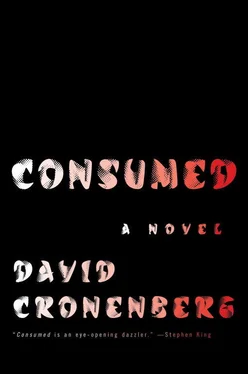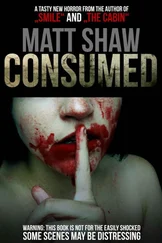He was not small, Bak Myun Mok, but he was arrogant and therefore slow and unprepared for my attack. Because we were not allowed to bring cameras and cell phones to our retreat, there are no photographs or videos of the expression of my rage, though the aftermath—Bak’s broken cheekbone, his black eyes, his shredded lower lip—was duly recorded by the police photographer summoned to the villa. Through all of this, Célestine was profoundly absent and vacant-eyed, increasingly anesthetized by her own spiraling reactions to The Judicious Use of Insects . I won’t go into the overall delicious scandal, which is well documented on the internet. Suffice it to say that the voting procedure was quite irregular, the palmarès was a satisfactory pandemonium, and the North Korean film won a Special Jury Prize—for “artistic subversion and visual elegance”—in consolation. Dragan, the president, voted against this, though he had clapped his hands in delight as Bak and I rolled around on the floor, exclaiming in several languages that this was real cinema and unsuccessfully encouraging the rest of the jury to join in. Bak also voted against the prize, his vote conveyed from a dentist’s office in Cagnes-sur-Mer, where he was having emergency treatment on an upper-left bicuspid which I had loosened when I smashed his face into the replica Winter Palace Dutch tiles of the ballroom floor. When I grabbed his hair and dragged his head towards the solid ebony voting-table leg, the action had produced a satisfying smear of saliva, blood, and mucus on the tiles, mostly from that rocking tooth splitting the gum it was embedded in.
Bak later swore that he had been mistranslated and that he had a deep respect for all women, particularly intellectual women like Célestine, and was incapable of even thinking of words like that in relation to her. Yolanda later came to us in Paris, technically as a witness in the assault investigation proceeding against me, but emotionally to sob and whine about the loss of her festival job and the general degrading of her standing in the community of translators. She did ultimately end up in bed with me and Célestine, and was very sweetly needy and desperate sexually, which of course was a delight to me, and would normally have been to Célestine, but she was still benumbed. It was only when I forced Yolanda to describe our sex play in real time in the most obscene way in both Spanish and Korean that Célestine was somehow resuscitated.
I had entered Yolanda from the rear—not anally, you understand; she resisted that—and Célestine had her back up against mine. As she heard the breathy, ragged, dirty phrases coming from deep within Yolanda and mounting in intensity, she turned until her belly was against my back, reached across my head, and grabbed Yolanda by the chin and the hair. She rotated Yolanda’s head until the shocked translator had to twist towards me to avoid having her neck snapped, and then, face to face now, Célestine said, “And the meaning of the title, then? You can explain it to us and reveal the sinister malignancy it encodes according to Bak Myun Mok? I saw you talking to him in the halls of the Festival Palace. You were flirting with him. He must have confided in you.” At first Yolanda was understandably confused, firstly because Célestine spoke to her in her very imperfect Spanish, and then not least because she had seemed to be on the verge of a monumental orgasm, one which had a Moorish flavor somehow, or perhaps that was just my delusion, and now had twisted me out of her, leaving her to pump frantically against my right knee, which had been aching in its chronically unpredictable way, so that I had to shift her pudendum to my left knee.
Most of this melodrama is, as I have said, embodied in the famous essay, famous for the personal events that it revealed as much as for its radical, some say unhinged, approach to consumerist philosophy. What Yolanda said in our bed about the North Korean film did not satisfy Célestine. Bak Myun Mok’s interpretation fell along traditional political lines: staggering under the burden of a crushing drought, the poor villagers in the film—who lived in a hermetically sealed fantasy of a timeless proto-Korean village—were forced by their rulers to supplement their protein-poor diets with insects, which were viewed as noxious and disgusting by the filmmakers, although of course considered legitimate delicacies elsewhere in the world. (Even in modern South Korea, beondegi , steamed or boiled silkworm pupae, looking unashamedly segmented and insect-like, are a popular street snack food.) The title word judicious was used with irony, in the sense of “desperate,” “last-gasp.” But in the stunning and brilliant new world of North Korean Juche Idea, or neo-Stalinist self-reliance, one would not have to resort to insects to feed one’s children, and this was exemplified in the most didactic, programmatic way by the revolt of the peasants against their village elders, who were all members of a violent, repressive, shamanistic caste that promoted insect-eating as a religious imperative. Did not Célestine see the crude propaganda involved? Was she seduced so totally by the retro visual style of the movie, so strangely in color and camera movement like a lush Douglas Sirk Hollywood melodrama of the 1950s?
What Célestine did see was a work created expressly for her by, unaccountably, a North Korean movie director whom she had never heard of and who probably, given the geo-fencing of the country, had never heard of her. How was this possible? Of course, she recognized the inevitable theory that this was a solipsist reverie, but in the spirit of inner drama it didn’t matter if it was: it had meaning for her, and gave her a philosophical project. Korean cinema, particularly North Korean, became an obsession for Célestine, but of course, given its unorthodox trajectory, it did not require study of Korean history or even the actual watching of Korean films. No. It required research of the subversive, subterranean kind, and so I came home one evening, for example, to find our apartment full of acolytes of Simon Sheen, also known as Shin Sang-ok. Shin was most famous for having been kidnapped in Hong Kong, along with his actress ex-wife, Choi Eun-hee, by the future dictator of North Korea, Kim Jong Il. Kim was a movie fanatic who understood the propaganda value of film, and also knew movie charisma when he saw it. And he didn’t see it in North Korea, so he kidnapped it. (The evening proved to be dismal and awkward, with no narrative to speak of, though Célestine was enraptured by the Sheenians’ somewhat confused presence.)
Célestine convinced herself that the director of Judicious was not Korean at all, but was in fact a kidnapped French director who knew her very well and was signaling her through his film. Bak had claimed that Supreme Leader Kim Jong Un himself was the movie’s producer, following the principles set out in his father’s book On the Art of Cinema , and so, given that the passion for movies still flourished in Pyongyang in tandem with neo-Stalinist ruthlessness under the guise of the Juche Idea, why would they not kidnap the best appropriate director? Why would they not kidnap Romme Vertegaal?
SO. “WE MUST DESTROY the insect religion,” she said.
“Tina, are you really awake? Are you dreaming? Do you know what you’re saying?”
[“Tina?” said Naomi.]
[“From Céles tine . And we both loved Tina Turner, the American singer.”]
[“Okay. So, Tina.”]
“He would be forty-two now,” she said.
“Who would?” I asked, though I knew the answer.
“Romme,” she said. “He was almost exactly twenty years younger than me.”
You need to know that while there was always Aristide, there were also what we called lacunae, intervals when we needed to be apart. And inevitably filling those lacunae for Célestine was Romme, a brilliant young and radical filmmaker who left his Sciences Po studies to communicate his politics through the art of cinema. Strange politics, and strange cinema: an obsession with Ike Eisenhower, China, the 1950s in America, and the films of Douglas Sirk. Romme Vertegaal was a student of Célestine’s, and of course her lacunate lover as well. He was Dutch born and ridiculously tall, and he stressed to Célestine right from the very beginning that, perhaps in keeping with his extreme height, his eye was always on oblivion. “Blessed, blessed oblivion,” the original Beats would have tattooed on their shoulders, and Romme had those words tattooed on his heart. It was clear that he intended to disappear, to “obliviate,” and eventually he did, leaving Célestine quite devastated. We had just reconnected, filling our latest lacuna with ourselves, and the substance of our rekindled talks was this newly lost love of hers, and the unexpected pain it caused her hurt me too, because I thought she would never recover from it, and therefore any love between us would be experienced in the shadow of this holy, much greater, lost love. Romme was a spectacular young man even beyond his absurd, almost surreal height. Perhaps you have encountered some of his works on YouTube. They are stunning.
Читать дальше
Конец ознакомительного отрывка
Купить книгу







![David Jagusson - Fesselspiele mit Meister David [Hardcore BDSM]](/books/486693/david-jagusson-fesselspiele-mit-meister-david-har-thumb.webp)




